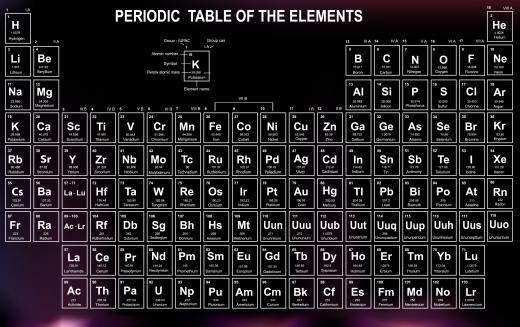What is Erbium?
 Mary McMahon
Mary McMahon
Erbium is a metallic chemical element grouped among the so-called rare earth metals on the periodic table of elements. Most chemists prefer to refer to these metals at lanthanides, since “rare earth” is a somewhat misleading term. Like other lanthanides, erbium has several applications, especially in the field of nuclear science, and it is also used in the production of some consumer goods. The world's primary source of this element is China, where it is relatively abundant, in marked contrast with the “rare” in “rare earths.”
This element is not usually found isolated in nature, since it is somewhat reactive. Most erbium is extracted from monzanite or gadolinite, two minerals which contain several metals in the lanthanide group. When erbium is isolated, it is soft, with a silvery luster which can tarnish in moist air. The element is identified with the symbol Er on the periodic table of elements, and it has an atomic number of 68.

Carl Mosander is usually given the credit for the discovery of this element, although he never actually succeeded in isolating it. While the Swedish chemist was performing research on gadolinite from the Ytterby mine in Sweden, he found three distinct fractions in the rock, one of which turned out to be an impure form of erbium. By 1905, chemists had succeeded in isolating erbium, which was named for the Ytterby mine. However, it took another 30 years for chemists to be able to reliably isolate this element.
Erbium is often used as a dopant in lasers, and it can also be used in various metal alloys to make them more workable. The element is also used to dye glass and glazes for porcelain, and it is useful in some nuclear applications. Erbium also produces a distinctive rose colored oxide known as erbia which is used to dye glass, lenses, and cubic zirconium. The pink color can be quite rich, especially under the right lighting.
As is the case with other lanthanides, erbium is presumed to be at least mildly toxic, and most people observe basic safety precautions when handling it. Dust from erbium can pose an explosives hazard, since it will react with the air, and the element has no known biological role in the human body, making ingestion a probably unwise move.
AS FEATURED ON:
AS FEATURED ON:











Discuss this Article
Post your comments